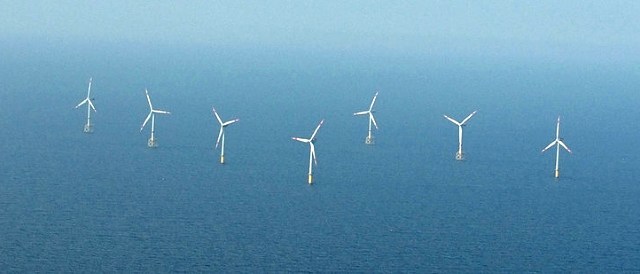In January, Eurosolar produced a memorandum during the debate about changes to German energy policy. Craig Morris says the discrepancies and overlapping between the memorandum and what actually became law in August shows where there is disagreement and general consensus.

Offshore wind power continues to be oversubsidized – one of the things Eurosolar criticized during negotiations for the current EEG. (Photo by Martina Nolte, CC BY-SA 3.0 DE)
Founded in 1988, Eurosolar was originally the brainchild of the late Hermann Scheer, who passed away in 2010. A Social Democrat member of Parliament, Scheer was a driving force behind the Energiewende in the 1990s and 2000s, partly through Eurosolar.
Since his death, the definition of the Energiewende has evolved away from Scheer’s vision of a 100 percent renewable supply largely based on distributed generators owned by citizens and communities. The focus is now more on the cost impact.
But the spirit of Scheer’s revolution lives on, not only at Eurosolar, but also among Germany’s Energy Bloggers, who awarded Eurosolar’s memorandum on policy changes (in German) their “Next Top EEG” prize this year. So what did Eurosolar recommend, and are the government’s changes that became law in August in line with those recommendations?
Wind power
Eurosolar is practically the only organization that points out the numerous double standards for offshore wind. As I have pointed out, onshore wind farms (generally owned by citizens and small businesses) have to pay more of the cost of grid connections than offshore wind farms (owned by corporations) do; furthermore, the offshore sector can pass on losses to consumers while it waits on a grid connection, whereas the onshore sector has always had to eat these losses. And while many were justifiably concerned about overpaying solar recently, the returns for offshore wind are demonstrably excessive. First, profits are squeezed into the first eight years for offshore wind, while they are spread across 20 years for onshore wind; second, power production at the first offshore wind farms is far above expectations, so feed-in tariffs should be lowered. The focus, Eurosolar argued, should therefore be on onshore wind.
What the new law says: The government did not reduce feed-in tariffs for offshore wind but did institute a slightly lower target for 2020: 6.5 GW. A new corridor for new annual wind power installations was implemented: 2.4-2.6 GW per year. If more is installed, the feed-in tariffs for subsequent turbines is reduced ahead of schedule (instead of at the end of the year).
Biomass
The memorandum has nothing to say about biomass at all – a clear sign of how little support there is for this energy source in the country. Biogas is mentioned only once in the context of flexibility options that will make a capacity market unnecessary.
What the new law says: The new EEG sets a very low limit for biogas of 100 MW per year. In line with Eurosolar’s idea, electricity from these units will be required to react to price signals. Here, there seems to be a good deal of consensus.
Photovoltaics
The memorandum focuses on speaking out against the application of the renewables surcharge to solar power consumed directly (without being sold to the grid). In the foreign press, this surcharge has been referred to as a “solar tax.” Eurosolar also calls for the limit of 52 GW of PV to be done away with; when that much has been installed, PV will no longer be eligible for feed-in tariffs. Eurosolar also wants annual installations to be increased from the current target of around three GW per year to “at least 5 to 6 GW.”
What the new law says: The targets were not changed, and the government implemented the surcharge, though it exempted systems smaller than 10 kilowatts. But afterwards, grid operators (who collect the fees) announced (press release in German) that they had no capability of doing so, so the policy is currently in limbo until details can be specified. This detail is also a good example of how much of a rushed effort the amendments of August were.
Otherwise, there was only consensus between Eurosolar’s memorandum and the new amendments on two items: no retroactive changes should be made to existing systems (no changes to feed-in tariffs, etc.); and policy changes must be subject to parliamentary review – not handed down by ministerial decree.
There was more disagreement, with the memorandum speaking out against several ideas in the law:
- The implementation of auctions for a growing segment of the market.
- The current level of industry exemptions to the cost of renewable power (the new law tweaks those exemptions, but the overall burden remains roughly unchanged).
- The requirement of “direct marketing” (briefly described here).
These are just a few highlights from the memorandum, but clearly Eurosolar – and the Energy Bloggers – cannot be happy with the new amendments.
Incidentally, the Energy Bloggers are holding a bar camp on 19-20 September in Kassel if you speak German and would like to attend.
Craig Morris (@PPchef) is the lead author of German Energy Transition. He directs Petite Planète and writes every workday for Renewables International.
Greetings Craig! I’m looking to expand the english Eurosolar wiki article, but I lack sources in the language, all I could find was a lot of german pages ( which is reasonable enough but I can’t read it ) would you be able to help me out? Thank you for your time.